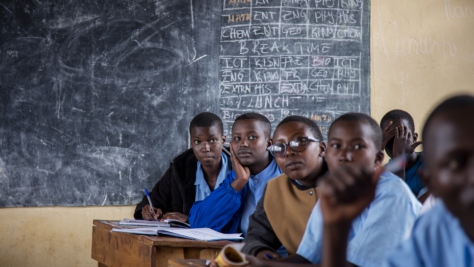Ethiopia: Somali refugees to be relocated away from border
This is a summary of what was said by UNHCR spokesperson Jennifer Pagonis – to whom quoted text may be attributed – at today's press briefing at the Palais des Nations in Geneva.
In Ethiopia today (Friday), UNHCR teams are expected to start relocating a group of 500 newly-recognized Somali refugees who fled from renewed conflict in strife-torn south and central Somalia over the last year. They have been staying around the Kebribeyah area, near the Somali border in eastern Ethiopia and are being relocated to a re-opened UNHCR camp at Teferi Ber.
The refugees are part of a group of 4,000 Somali refugees who have recently been granted refugee status by UNHCR and the government's Authority for Refugees and Returnees Affairs (ARRA). An estimated 7,000 additional Somalis who also claim to have fled fighting and insecurity in Somalia, are waiting to be screened at other sites in eastern Ethiopia.
The new camp site at Teferi Ber, some 120 km north of Kebribeyah, was formerly a UNHCR camp which in the 1990s hosted some 49,000 mainly Somalis refugees who had fled fighting in their country. The camp was officially closed in 2001 after all the refugees returned, mainly to the self -declared republic of Somaliland.
After arriving at Teferi Ber, the refugees will spend three days in a reception centre where they will be allocated plots of land to construct homes and given building materials. They will also be given food as well as tarpaulins, blankets, sleeping mats, kitchen sets, jerry cans, kerosene stoves, and soap. The ARRA has established a temporary health centre until permanent structures can be built.
The Somali Region of Ethiopia already hosts more than 16,500 refugees. With the new arrivals, the total is 20,300. At the peak of the Somali refugee crisis in the early 90s, the region hosted 628,000 refugees in eight camps. The overwhelming majority went home between 1997 and 2005, and all of the camps were closed except a camp at Kebribeyah.
Related news and stories
Thousands of newly arrived Somali refugees in Ethiopia relocated to new settlement
Samira's Story
Drought brings life-threatening food shortages for refugees in Ethiopia
100,000 new Somali refugees arrive in Ethiopia in the past month, UN and partners are calling for urgent funding
UNHCR teams and partners rush assistance to some 100,000 newly arrived Somali refugees in hard-to-reach area of Ethiopia
As the Horn of Africa drought enters a sixth failed rainy season, UNHCR calls for urgent assistance
-

UNHCR seeks US$164 million for displaced Central Africans
26 Feb 2021 -

The Global Cost of Inclusive Refugee Education.
26 Feb 2021 A joint report by UNHCR and World Bank, estimating the cost of educating refugee children in host country national education systems. -

Understanding the socioeconomic conditions of refugees in Kakuma Camp, Kenya - Infographic
26 Feb 2021 The Kakuma Socioeconomic Survey contributes to inform targeted responses to improve the living conditions of refugees and hosts. It also addresses the socioeconomic impacts of COVID-19 on refugees. -

Refugees in Sudan reap benefits of clean cooking energy
26 Feb 2021 A switch to ethanol reduces risky trips in search of firewood, slows deforestation and creates healthier home environments for refugees in White Nile state. -

Eye operation draws life into focus for young refugee
25 Feb 2021 Cataracts gradually robbed six-year-old Azaiya of his sight. A corrective operation allowed him to see a world with opportunities. -

Education for all refugee children is within reach - finds World Bank-UNHCR report
25 Feb 2021 -

UN agencies begin processing at Matamoros
24 Feb 2021 -

Helping vulnerable children to find their inner hero
24 Feb 2021 Syrian refugee wins UNHCR Innovation Award for an inventive project that helps vulnerable children overcome trauma linked to past experiences. -

UNHCR Global Procurement Plan 2023 (PDF)
24 Feb 2021 This document outlines UNHCR's Global Procurement Plan in 2023, segmented into months.
